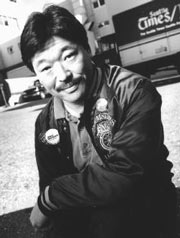WITHIN 24 HOURS of his narrow re-election loss in November 2000, Seattle Teamsters reformer Bob Hasegawa was crying voter fraud. Now, 17 months later, Hasegawa has the U.S. secretary of labor and federal prosecutors in his corner, teaming up against his former union local in U.S. District Court.
Some of the 6,500 members of Local 174, the region’s second largest Teamsters unit, told Hasegawa they’d been barred from voting, while, conversely, nonmembers were allowed to cast ballots.
The election was rigged, claimed Hasegawa, the local’s three-term secretary-treasurer. He quickly filed a complaint challenging about 60 votes with local Teamsters officials—most of them loyal to James P. Hoffa, the old-guard leader of the International Brotherhood of Teamsters and son of disappeared former Teamsters head Jimmy Hoffa.
Out of almost 3,000 votes cast, just five ballots separated the liberal Hasegawa, a former United Parcel Service driver, and his challenger Scott Sullivan, a Hoffa moderate. Hoffa’s international took over the vote count in an apparently unprecedented move.
Contrary to U.S. labor regulations, a Hoffa representative reportedly questioned the union status of some UPS drivers and invalidated their votes. In a recount, Hasegawa came up two votes short. He filed further appeals—all rejected by the international.
Now, U.S. Secretary of Labor Elaine Chao claims Local 174 violated U.S. labor-management laws. She is seeking to void the two-vote win that put Sullivan in office and force a new Teamsters election.
Department of Labor (DOL) officials say the alleged illegal votes affected a half-dozen other Local 174 races and that those should be revoted on as well.
“In a nutshell,” Hasegawa said last week, “the DOL agreed with me that Hoffa and his cronies illegally stole the Local 174 election by using his official capacity to tamper with the vote count.”
But while he’s pleased to have the U.S. backing, Hasegawa says he’s dismayed by the plodding tempo of the case, which was quietly filed in December.
“Everyone expected this to be slow going, but at the pace it’s going there is no way that the courts will make a decision before the next regularly scheduled [local] election,” he says.
Labor and Justice officials are saying little—a DOL attorney last week referred calls to the U.S. attorney’s office here. Seattle spokesperson Robert Taylor says talks between the two sides continue. “We’re moving along,” he reports. What’s the U.S. position? “We don’t know that there was a grand conspiracy to defraud,” he says. “But there were irregularities in the election.”
Hasegawa is pushing for more aggressive tactics. Otherwise, he says, “The message to Hoffa and other unscrupulous union officials is, ‘Go ahead and steal elections.'”
According to court documents and interviews, Hasegawa filed his protest with the Teamsters’ Joint Council 28, the regional ruling body, Nov. 22, the day after the election.
When the Joint Council failed to act on Hasegawa’s complaint, he went to the feds, who launched their own probe. Initial talks between the U.S. and Teamsters broke down when the government wouldn’t budge on its call for new elections. The U.S. filed suit Dec. 7 claiming new union applicants “who had met the requirements for membership . . . and were in good standing were denied the right to vote,” while “individuals who were not members of Local 174 were allowed to vote.”
Kenneth Pedersen, attorney for Local 174, which includes cartage, construction, food industry, and government workers, says the case is without merit and wants it dismissed.
Hasegawa was elected on a progressive Teamsters for a Democratic Union platform in 1991, when reformer Ron Carey was elected as the international’s president and was promising to save the corruption-riddled union. But after Carey himself fell from grace—for allegedly misusing campaign funds in 1998, although he was later cleared of all charges—Hoffa the son took over.
Though Hasegawa’s anti-Hoffa feelings were obvious (just before the 2000 election, he called the revamped Teamster magazine a “piece of shit. You got Hoffa’s picture on every page . . . “), some of Hasegawa’s supporters were crossing into Sullivan’s camp. One former backer accused Hasegawa of himself employing “the old guard’s leftover trappings of power” and allowing wages and working conditions to crumble.
Sullivan (he and international Teamsters officials did not respond to interview requests) vowed to depoliticize the secretary-treasurer’s role and let the rank and file lead. He continued to snipe at Hasegawa’s style after the election. “There are only a few things that are guaranteed these days, like death, taxes, and protests from Bob Hasegawa,” he said in a 174 newsletter last year, accusing Hasegawa of “crowing like a rooster in a barnyard all over the Northwest” and likening him to Chicken Little.
Hasegawa, seeking national Teamsters office at the time, filed an election complaint about that, too. A union referee decided the name-calling was “entirely appropriate” for the Teamsters. Hasegawa subsequently lost his bid for regional vice president on the reform ticket.
Not that any of that mellowed him. With “the old-guard family connections running Local 174 and the local Teamster bureaucracy” again, he protested last week, “this area is becoming a little Chicago.”








